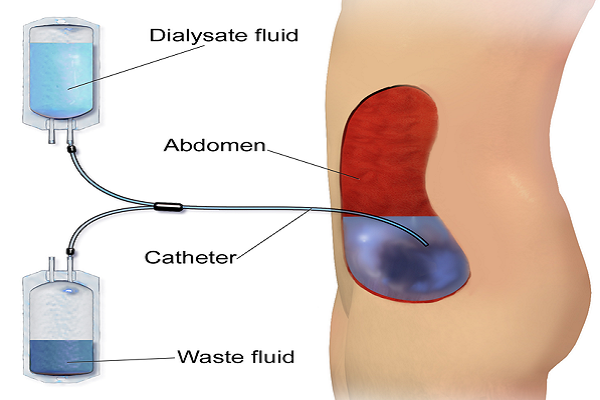
Written By: Dt.Hetal Mehta
Get an Answer from Experienced Dietitian for your Queries on this Post - Check End of the Article to Leave Your Comment or Query.
Dialysis is a treatment which is given to clear the waste products from the body when the kidneys are unable to take care of the body. It happens when the kidney loses its functioning capacity by 85-90% (end stage of kidney failure) and the glomerular filtration rate is <15.
- It helps to remove waste salts and extra water from the body
- Maintains right level of sodium, potassium and bicarbonate levels in the body.
- Maintains right blood pressure.
There are 2 different types of dialysis:
Hemodialysis: In Hemodialysis, blood is pumped out of the body, to an artificial kidney machine, purified from wastes, and then returned to the body by the tubes connected to the machine.
Peritoneal Dialysis: In Peritoneal Dialysis, the inside lining of one's own belly, acts as a natural filter, wherein wastes are taken out by means of dialysate (cleansing fluid), which is washed out in and out of the belly in cycles.
Since Dialysis is a result of kidney failure, having the right Diet is of utmost importance to maintain proper blood nutrient and electrolyte levels

Some important dietary tips to be followed are:
Eat more high and good quality (bioavailable) protein foods like (8-10 ounces)
Eggs, low sodium cheese, low sodium lunch meat, etc, as it produces less waste for removal during dialysis.
{ Also Read: What is Dialysis }
Besides, Few nutrients need to be closely monitored and controlled to maintain the body's right nutritional status which are:
Fluid intake:
- Excess fluids can lead to swelling and weight gain between dialysis sessions
- Changes in the blood pressure
- Heart trouble due to extra workload on the heart
- Difficulty in breathing due to fluid build up in the lungs.
Potassium levels:
The rise in potassium levels between Dialysis sessions can affect the heart and cause death. Hence, limiting potassium-rich foods like avocado, banana, Kiwi, dry fruits, etc. are very important
Phosphorous levels:
Too much phosphorus in the body pulls away calcium from the bones. This can lead to weaker and brittle bones. It also leads to itchy skin.
Hence, having enough protein sources (not more than required) like milk and meat which also contains phosphorus is very crucial.
Besides, one should also avoid other phosphorus rich foods like packaged foods, nuts, poultry, fish, peanut butter, beans, cola, tea and so on.
Having certain phosphorus binding medicine as prescribed by the doctor can also help in controlling blood phosphorus levels.
Sodium levels:
Sodium is a part of salt, found in many canned packaged, frozen and fast foods, spices, seasonings and so on
So it is beneficial to avoid these as too much sodium will make one thirsty and drink more liquid which can, in turn, cause adverse effects.
Avoid salt substitutes as well because they contain more potassium.
Besides, having enough calories with vitamin and mineral supplements (if required) is very crucial to sustain the body's energy and keep the body's nutritional status to the mark.
“We would greatly appreciate it if you kindly give some feedback on this article

Add new comment